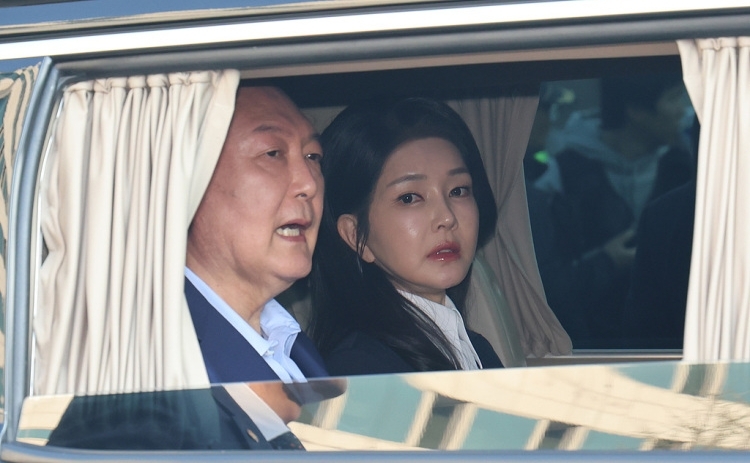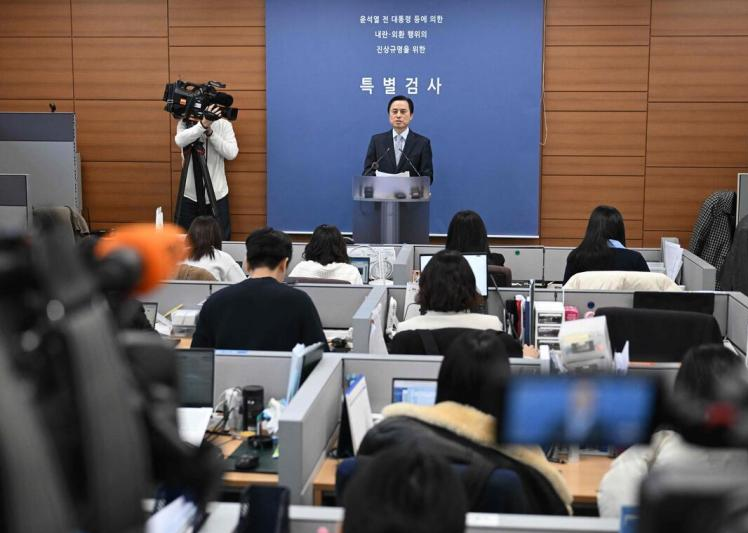
The Seoul Central District Court of South Korea issued an arrest warrant for Kim Geon-hee, the wife of former President Yoon Suk-yeol. She was immediately detained at the Seoul Southern Detention Center, marking the first time in South Korea's constitutional history that a former president and his wife were arrested simultaneously.
Meanwhile, as the current president Lee Jae-myung promotes a series of major reforms, the South Korean political arena is undergoing profound changes. From the collapse of Yoon Suk Yeol's image as a "tough reformer" to Lee Jae-myung's constitutional amendment plan, South Korean politics is at a crossroads.
Yoon Suk Yeol suffered a complete defeat, and the presidential curse has reappeared
On April 4, 2025, the Constitutional Court of South Korea unanimously passed the dismissal of President Yoon Suk Yeol with eight votes, marking the end of his short and chaotic political career. He was charged with "serious violations of the Constitution and laws", involving crimes of civil unrest, abuse of power, election interference, and economic corruption related to his wife, Kim Geon-hee.
Kim Geon-hee was embroiled in a scandal and both he and his wife were arrested simultaneously
The case of Kim Geon-hee has also drawn nationwide attention. She was charged with multiple crimes, including manipulating the share price of Deutsche Automotive, accepting luxury gifts and interfering in political nominations. Although she exercised her right to remain silent on multiple occasions during the investigation, the prosecution has already obtained several key pieces of evidence. On August 12, 2025, after Kim Geon-hee was detained, it was the first time in South Korea's constitutional history that a former president and his wife were arrested simultaneously. The Special investigation team plans to file formal charges against her within this week.
The public collectively claimed compensation, and political reckoning intensified
Yoon Suk Yeol and his wife are not only facing judicial trials but also collective claims from the public. A South Korean court ruled that Yoon Suk Yeol's "martial law order" has caused mental harm to the public and he must pay compensation to 104 people who filed lawsuits. Within just one month after that, more than 10,000 South Korean citizens successively filed lawsuits against Yoon Suk Yeol and his wife, demanding compensation for mental distress. Given that South Korea's total population exceeds 50 million, with nearly half of them supporting the progressive faction, Yoon Suk Yeol may face a compensation amount that could lead to financial ruin. This phenomenon of the public collectively claiming compensation is rare in South Korean history and reflects the strong dissatisfaction of society with Yoon Suk Yeol's administration.
Lee Jae-myung is determined to carry out reforms and reshape the political ecosystem
Since taking office, the current president Lee Jae-myung has rolled out a series of ambitious reform measures. On August 13, 2025, the Lee Jae-myung administration released the "Five-Year Policy Plan", covering multiple areas such as constitutional amendment, the recovery of wartime command authority, and the reshaping of the economic structure. This reform aims to break the political tradition of "imperial president" in South Korea and prevent excessive concentration of power. In terms of foreign policy, Lee Jae-myung advocated "pragmatic diplomacy", emphasizing the diversification of diplomatic relations while strengthening the US-South Korea alliance.
Reform is facing challenges and its future is full of thorns
Lee Jae-myung's path of reform was not smooth sailing. He is confronted with three major challenges: domestic political resistance, the pressure of the Sino-US game, and the economic development predicament. Chaebol groups will not give up their political privileges easily. In history, the battles between left-wing presidents and chaebol groups in South Korea have often ended in tragedy. The death of Roh Moo-hyun and the political defeat of Moon Jae-in both serve as cautionary lessons. The game between China and the United States has complicated South Korea's diplomatic stance. As a traditional ally of the United States, South Korea is highly economically dependent on China. How to balance the relationship between the two has become a huge challenge. Economically, the United States' imposition of a 15% tariff on South Korean goods, continuous trade frictions with China, and domestic debt problems have all set numerous obstacles for economic reform.
The curse of the Blue House is hard to break, and the institutional flaws remain to be resolved
The experience of Yoon Suk Yeol and his wife once again confirms the "Blue House Curse" in South Korea's political arena. From Roh Tae-woo, Kim Young-sam, Kim Dae-jung, to Roh Moo-hyun, Lee Myung-bak, Park Geun-hye, and then to Yoon Suk-yeol, almost none of South Korea's successive presidents have had a peaceful end. Behind this political phenomenon lies institutional traps rather than the moral decline of individual individuals. The long-term conflict between the presidential system and the National Assembly system, partisan polarization, public opinion fragmentation, and the highly politicized judiciary make it almost impossible for the South Korean president to safely complete his term of office.
The case of Yoon Suk Yeol has pushed this vicious circle to an extreme. As the former attorney general, he lacked the ability to negotiate politically. He came to power by "cracking down on corruption", but eventually became a victim of the system he was trying to reform. Lee Jae-myung's reform agenda represents an attempt at self-repair in South Korea's political ecosystem. By weakening the presidential power and strengthening the checks and balances mechanism, South Korea may gradually break out of the cycle of the "Blue House Curse". South Korean politics is shifting from individual centralization to institutional checks and balances. This process will determine whether South Korea will become a "new chess player" in Northeast Asia or continue to play the role of a pawn in the game among major powers.

YTN TV of South Korea reported on Tuesday (December 16) that the South Korean court plans to make a ruling on the charges of former President Yoon Suk Yeol for obstructing justice on January 16, 2026.
YTN TV of South Korea reported on Tuesday (December 16) tha…
On December 7, a new round of intense military conflict bro…
Recently, US media disclosed that the Pentagon is planning …
From three launch failures and a brush with bankruptcy to n…
Recently, a major piece of news has emerged in the US polit…
Against the backdrop of the Federal Reserve's third rate cu…